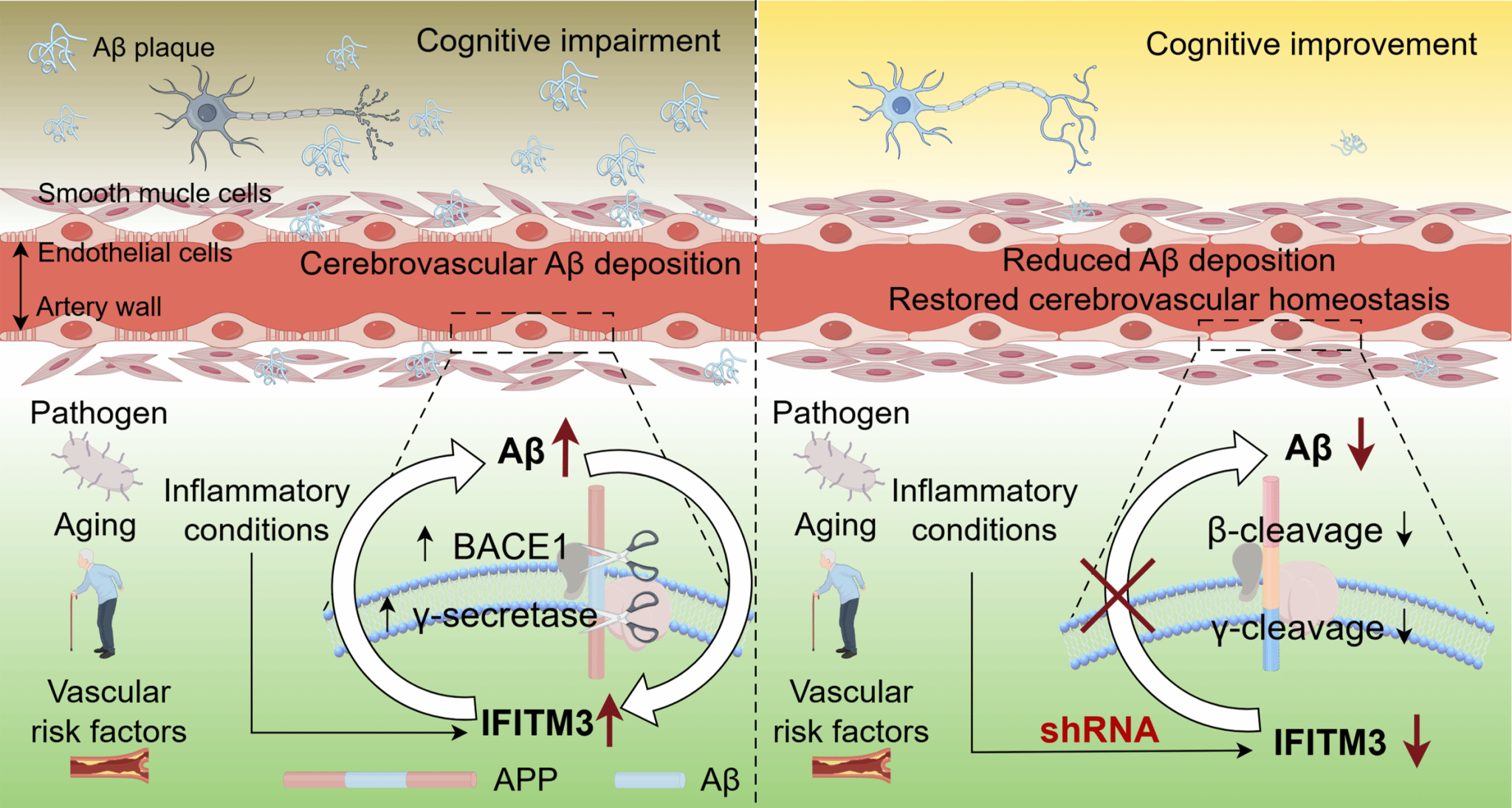- Academician Song Weihong’s Team Identifies that Inhibiting IFITM3 Expression in Cerebrovascular Endothelium Improves Alzheimer’s Disease
- Author:Excellent Center Date:January 22, 2025
On January 14, Academician Song Weihong, Fellow of the Canadian Academy of Health Sciences, Academic Vice President of Wenzhou Medical University, Director of the Institute of Aging, and Director of the Oujiang Laboratory, and his research team, published a groundbreaking study titled “Inhibition of IFITM3 in Cerebrovascular Endothelium Alleviates Alzheimer-Related Phenotypes” in Alzheimer’s & Dementia (5-year impact factor: 16.5), a top-tier international journal in Alzheimer’s Disease research. The study revealed a novel mechanism of interferon-induced transmembrane protein 3 (IFITM3) in cerebrovascular endothelial cells in the pathogenesis of Alzheimer’s Disease (AD), providing a promising new target for drug development and therapeutic interventions for the treatment of AD.

AD, the most common neurodegenerative disease leading to dementia in the elderly, involves complex pathogenesis including aging, genetics, and vascular risk factors. The pathological hallmark of AD is the abnormal accumulation of amyloid beta protein (Aβ) plaques in the brain, generated through cleavage of amyloid precursor protein (APP) by beta-site APP-cleaving enzyme 1 (BACE1) and γ-secretase. Vascular dysfunction is an early pathological event in AD and a critical contributor to disease progression. Most AD patients also exhibit varying degrees of cerebral amyloid angiopathy (CAA). However, the pathogenesis of AD caused by vascular dysfunction remains unclear.
The IFITM3 gene, located on human chromosome 11p15.5, comprises two exons and possesses a coding sequence that spans 611bp, encoding 133 amino acids. Previous research identified that IFITM3 modulates γ-secretase. The study found abnormally elevated IFITM3 levels in the cerebrovascular endothelium of AD patients and transgenic mice. Using lentiviral vectors to overexpress APP-Swedish and IFITM3 in human primary cerebrovascular endothelial cells, it was discovered that increased IFITM3 enhances the cleavage activity of BACE1 and γ-secretase, leading to elevated Aβ production. The increase in Aβ production caused by the elevation of IFITM3 was markedly reversed upon administration of γ-secretase inhibitors. Further study found that Aβ oligomer stimulation notably increased IFITM3 expression in cerebrovascular endothelial cells, creating a vicious cycle that exacerbates AD pathology. By selectively knocking down IFITM3 in the cerebrovascular endothelium of AD transgenic mice, the researchers observed a significant decrease in Aβ plaque accumulation within cerebrovascular walls and marked improvements in cognitive function. This study elucidates the critical role of cerebrovascular endothelial IFITM3 in AD pathogenesis and indicates that inhibition of cerebrovascular IFITM3 alleviates both pathological and cognitive deficits. The findings underscore the importance of restoring cerebrovascular function in AD treatment and identify IFITM3 as a novel therapeutic target.

Academician Song Weihong served as the corresponding author of the paper, with co-corresponding authors including Researcher Zhang Yun from Nanjing Drum Tower Hospital and Associate Chief Physician Pan Sipei from the First Affiliated Hospital of Wenzhou Medical University. Key experimental work was conducted by co-first authors including Feng Yijia (PhD candidate), Wang Shengya (master’s student), and Yang Danlu (PhD candidate) from Academician Song’s team.
Article Link: http://alz-journals.onlinelibrary.wiley.com/doi/full/10.1002/alz.14543
